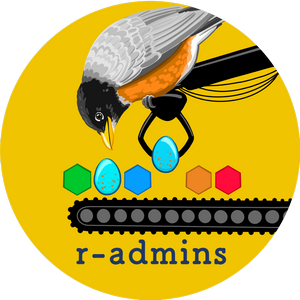The goal of this course is to teach the fundamentals of administering RStudio Team. The target audience for this course is system administrators at RStudio Full Service Certified Partners (FSPs) and customers.
The course covers installation, configuration, integration and usage of:
- RStudio Server Pro
- RStudio Connect
- RStudio Package Manager
The idea behind this course is to provide a solutions-first introduction to running RStudio products in professional enterprise envinronments.
We intentionally do not cover more advanced topics such as high-availability or kubernetes integration, preferring instead to focus on topics with the broadest appeal. If you're interesting in going beyond the topics covered in the course, please see the RStudio documentation site for more info.
Start by cloning the repo and then you can use the make command to build,
serve and test the site while you're making changes to it.
You will need make and a working Docker installation.
The site uses mkdocs with the
mkdocs material theme and
all of the files for the site are in the docs folder. The site is created
primarily using markdown, but the mkdocs site has full instructions if you
need them.
In addition to the standard mkdocs content, we also have custom theme
overrides (eg the footer) in the overrides directory. See the
documentation
for more info.
mkdocs provides tooling for local builds and running the site on a local web server so you can view content changes locally. For convenience and consistency we use a dockerised version of mkdocs.
The development server automatically refreshes content in your broswer as the underlying file is edited.
To run a local development server:
make serve
The site can then be viewed at https://localhost:8000. Use ctrl+c to quit.
And it's not usually necessary, but if you need to perform a local build:
make build
The build will be created in a site directory which git will ignore.
This site contains content -- such as video -- that is being distributed via the RStudio CDN and is not present in this repo.
- To put files on the CDN, add to the rstudio-cdn S3 bucket
- Then use the Cloudfront URL, in the form
https://cdn.rstudio.com/pro-admin/<filename.png>
It's helpful to be able to tell if any links are broken on the site.
The Makefile gives us two commands for doing this. One for local
development and one for the production site.
To test links locally run:
make serve
and then, in a separate session:
make test-local-links
The output will indicate if there are any problems with the links on the site.
To run against the production site:
make test-prod-links
The site is hosted on Netlify which will build and serve the site
automatically when changes occur in the master branch.
The Netlify build is currently controlled by two files, runtime.txt
and requirements.txt.
runtime.txtcontains the Python version used to build the site.requirements.txtis a standard python requirements file
Since local development uses docker, it's important to ensure the versions of python, mkdocs and any other dependencies are aligned.
Copyright RStudio, PBC and licensed under a Creative Commons Attribution-NonCommercial 4.0 International License.
